The educational materials listed on this page are about Organic Agriculture.
Organic agriculture integrates “cultural, biological and mechanical practices that foster cycling of resources, promote ecological balance, and conserve biodiversity.” Organic and sustainable agriculture often include the use of cover crops, crop rotation, use of tools and machinery for weed and pest management, and conservation tillage. Synthetic fertilizers, sewage sludge, irradiation and genetic engineering may not be used for food to be certified and labelled USDA organic. Organic livestock must have access to the outdoors and be “fed 100 percent certified organic feed, managed without antibiotics, added growth hormones, mammalian or avian byproducts, or other prohibited feed ingredients.” SARE has many helpful reads including Transitioning to Organic Production, which addresses conversion strategies, organic farming production practices, marketing approaches and federal organic standards for certified organic crop and livestock. SARE’s Crop Rotation on Organic Farms reviews how rotating crops improve soil quality and health and help manage pests, diseases, and weeds.
Showing 1-20 of 52 results
New SARE Video: Ecological Weed Management at the Martens Farm
Farmers nationwide are tackling the challenge of using ecological principles to manage weeds using fewer herbicides. Understanding the biology of weeds is key to helping producers adopt innovative strategies that achieve strong yields while adapting to changing consumer preferences. Three new videos from SARE illustrate how Klaas and Mary-Howell Martens manage weeds without chemicals on […]
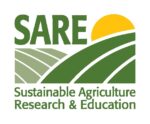
The Northeast Organic Grower Harvest Manual
A manual created by Roxbury Farm Harvest to help commercial, organic vegetable farmers with parameters on pricing, harvest indicators, harvest and postharvest handling procedures, and storage conditions. Each vegetable has a detailed explanation of the various market values, expected yield numbers, standards and the tools needed. Harvest and preparation procedures are laid out for each […]
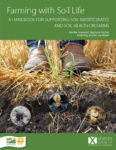
New Book: Farming With Soil Life: A Handbook for Supporting Soil Invertebrates and Soil Health on Farms
Smart farmers know that healthy soil hosts a flourishing and diverse ecosystem of bacteria, fungi and invertebrates. But the complex relationships between soil life, productivity and resilience are not well understood. Now available from the Xerces Society and SARE, Farming with Soil Life: A Handbook for Supporting Soil Invertebrates and Soil Health on Farms is […]
New SARE Video: Managing Weeds in an Organic Almond Orchard
Many organic and conventional farmers are seeking ways to eliminate or reduce their use of synthetic herbicides. Understanding weeds is the first step towards managing them efficiently and ecologically. Now, two new videos in SARE’s Manage Weeds on Your Farm series explore organic almond grove weed control on Burroughs Family Farm’s 1,200-acre orchard in Denair, […]
New SARE Video: Managing Weeds in Organic Row Crops
Farmers have long relied on herbicides to control weeds in row cropping systems. But as consumer preferences change, many farmers are seeking to eliminate or reduce their use of synthetic herbicides where possible. Managing weeds without herbicides can be daunting, and it requires producers to understand the biology and behavior of problem weeds in order […]
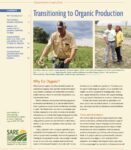
New SARE Bulletin: Transitioning to Organic Production
Since the 1990 Organic Foods Production Act passed, the market for organic products has steadily risen. In 2020, organic sales skyrocketed to an all-time high, motivating many farmers to consider transitioning their farms to organic production. While organic production can help farmers gain access to new markets, improve soil and increase profits, the transition process […]

Transitioning to Organic Production
Transitioning to Organic Production lays out many promising conversion strategies, covering typical organic farming production practices, innovative marketing ideas and federal standards for certified organic crop production.
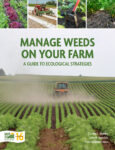
Manage Weeds on Your Farm: An Ecological Approach
SARE’s newest book, "Manage Weeds on Your Farm: A Guide to Ecological Strategies," examines the biology and behavior of common weeds and provides an integrated set of non-chemical control strategies that exploits their weaknesses.
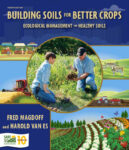
Updated Building Soils for Better Crops Focuses on Soil Health Fundamentals
SARE’s newest book, the fourth edition of Building Soils for Better Crops, provides rich detail on ecologically sound practices for developing and maintaining healthy soils. It is a must-read for farmers, educators and students alike.

Manage Weeds On Your Farm
Manage Weeds on Your Farm is a definitive guide to understanding agricultural weeds and how to manage them efficiently, effectively and ecologically—for organic and conventional farmers alike.

Building Soils for Better Crops
The fourth edition of Building Soils for Better Crops—enhanced and expanded—explains how to use ecological principles to build soil health and boost fertility, yields and overall sustainability.
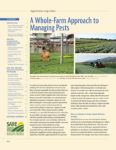
A Whole Farm Approach to Managing Pests
This 16-page bulletin helps producers—and the educators who work with them—use ecological principles across the entire farm to control pests.
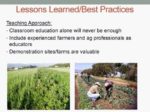
Supporting Farmer Training Programs in the West
“When I finally came (to ALBA’s Farmer Education Program), I learned so much! How to eat differently, how to plant without pesticides, how to harvest, move the boxes, move the product in the system.” -Maria Ana Reyes, 2015 graduate of ALBA’s Farmer Education Course. Like Maria Ana Reyes, new and beginning farmers often need technical […]
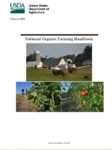
Growing the Field for Organic Conservation
As producers work to meet regulations under the National Organic Program (NOP) and become certified organic, they often apply conservation practices that align well with the Natural Resources Conservation Service’s (NRCS) conservation activities, such as green manures, buffer strips, and rotational grazing. NRCS assistance is being sought by both new and established organic farmers to […]

Climate-Sustaining Agriculture
Often, farmers are willing to make changes in their growing practices to reduce their greenhouse gas (GHG) emissions and their climate impact. Whether conventional or organic, agriculture can be a source of GHG emissions. Those farmers eager to modify their practices may lack the knowledge and tools to make effective choices. According to graduate student […]
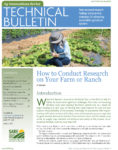
How to Conduct Research on Your Farm or Ranch
This 32-page bulletin outlines how to conduct research at the farm level, offering practical tips for both crop and livestock producers, as well as a comprehensive list of more in-depth resources.

Organic Production
Capitalize on the booming organic industry. This topic room has resources on organic systems, pest management, animal production, marketing, certification, conservation and much more.

Special Topics with Cover Crops and Soil Health
Organic and Specialty Crops Grazing Cover Crops Soil Health Policy Issues

Cover Crop Innovators Video Series
Find short video profiles of farmers around the country who are using cover crops on their land.
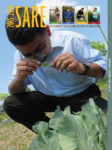
2015/2016 Report from the Field
Read about SARE-funded work in the areas of sustainable dairy cropping systems, soil health assessments, nutrient management, cover crops, beginning farmers, pollinators, technical assistance programs for women farmers, and more. This edition includes highlights of projects funded through the graduate student program, and the highly regarded Sustainable Agriculture Fellowship, a professional development program coordinated by SARE and NACAA.